八年级上册英语课堂笔记(1-6单元)汇编
八年级上册英语1--6单元知识点总结
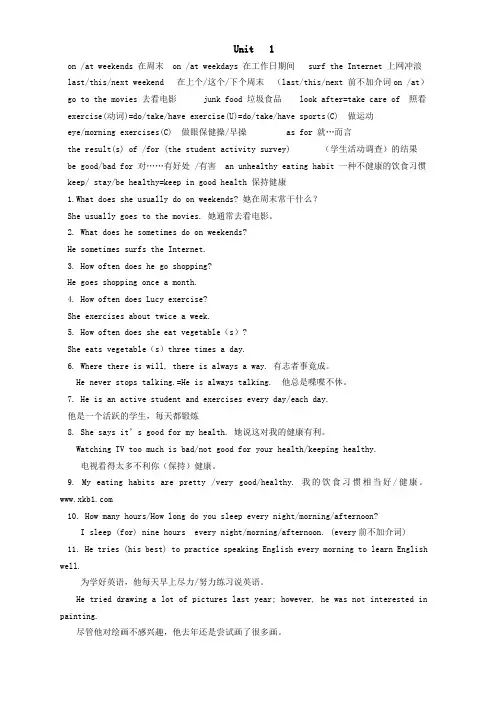
Unit 1on /at weekends 在周末 on /at weekdays 在工作日期间 surf the Internet 上网冲浪last/this/next weekend 在上个/这个/下个周末(last/this/next 前不加介词on /at)go to the movies 去看电影 junk food 垃圾食品 look after=take care of 照看exercise(动词)=do/take/have exercise(U)=do/take/have sports(C) 做运动eye/morning exercises(C) 做眼保健操/早操 as for 就…而言the result(s) of /for (the student activity survey) (学生活动调查)的结果be good/bad for 对……有好处 /有害 an unhealthy eating habit 一种不健康的饮食习惯keep/ stay/be healthy=keep in good health 保持健康1.What does she usually do on weekends? 她在周末常干什么?She usually goes to the movies. 她通常去看电影。
2. What does he sometimes do on weekends?He sometimes surfs the Internet.3. How often does he go shopping?He goes shopping once a month.4. How often does Lucy exercise?She exercises about twice a week.5. How often does she eat vegetable(s)?She eats vegetable(s)three times a day.6. Where there is will, there is always a way. 有志者事竟成。
八年级上册英语笔记总结
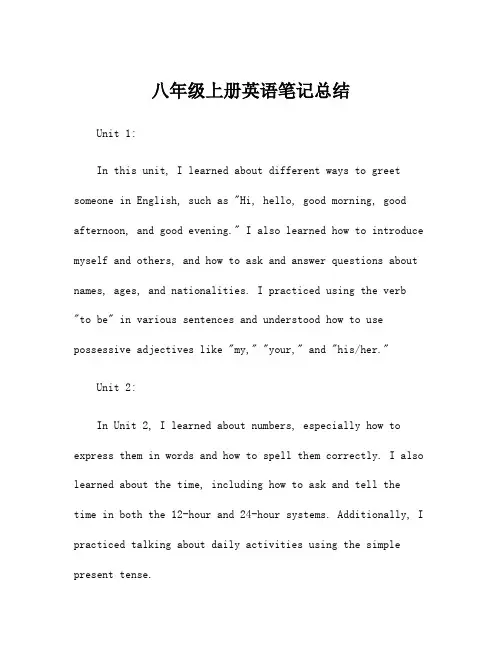
八年级上册英语笔记总结Unit 1:In this unit, I learned about different ways to greet someone in English, such as "Hi, hello, good morning, good afternoon, and good evening." I also learned how to introduce myself and others, and how to ask and answer questions about names, ages, and nationalities. I practiced using the verb "to be" in various sentences and understood how to use possessive adjectives like "my," "your," and "his/her."Unit 2:In Unit 2, I learned about numbers, especially how to express them in words and how to spell them correctly. I also learned about the time, including how to ask and tell the time in both the 12-hour and 24-hour systems. Additionally, I practiced talking about daily activities using the simple present tense.Unit 3:This unit introduced me to different places and how to ask for and give directions. I learned important vocabulary related to locations, such as "bank," "restaurant," and "hospital." I also practiced using prepositions of place and the imperative form to give directions and advice.Unit 4:In Unit 4, I learned about school subjects, such as math, science, and history, as well as how to express likes and dislikes about them. I also learned about hobbies and interests and practiced using the verb "to like" and "to love" to talk about activities I enjoy.Unit 5:This unit focused on family members and relationships. I learned how to talk about my family and the people in it, as well as how to describe appearances and personalities. I alsopracticed using possessive pronouns like "mine," "yours," and "theirs" to talk about ownership.Unit 6:In Unit 6, I learned about different kinds of food and drinks and how to express preferences for them. I also learned how to order food in a restaurant and how to use countable and uncountable nouns correctly.Unit 7:This unit introduced me to different types of clothes and accessories, including how to describe what I and others are wearing. I also practiced using the present continuous tense to talk about actions happening at the moment.Unit 8:In Unit 8, I learned about the past simple tense and how to talk about past experiences and events. I also practicedusing irregular verbs and time expressions to describe activities that happened in the past.Overall, this semester I have gained a solid foundation in basic English language skills, including grammar, vocabulary, and communication. I feel more confident in my ability to speak and understand English and look forward to continuing to improve my language skills in the future.。
人教版八年级英语上册单元笔记_I_(Unit1-Unit6)_本人原创
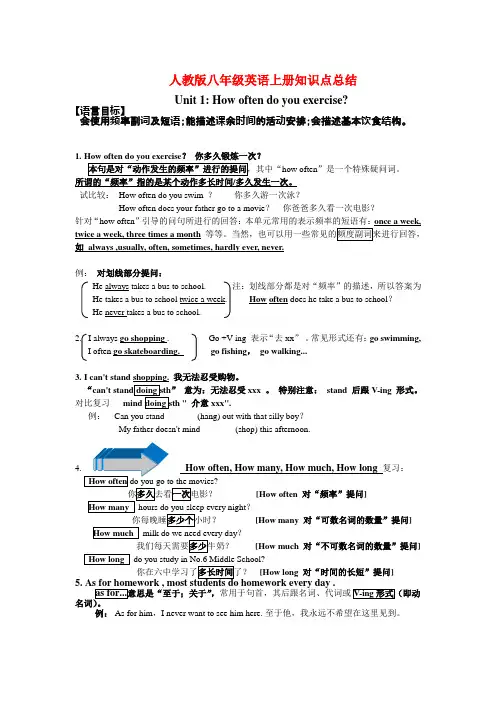
人教版八年级英语上册知识点总结Unit 1: How often do you exercise?【语言目标】会使用频率副词及短语;能描述课余时间的活动安排;会描述基本饮食结构。
1.How often do you exercise?你多久锻炼一次?本句是对“动作发生的频率”进行的提问,其中“how often”是一个特殊疑问词。
所谓的“频率”指的是某个动作多长时间/多久发生一次。
试比较:How often do you swim ?你多久游一次泳?How often does your father go to a movie?你爸爸多久看一次电影?针对“how often”引导的问句所进行的回答:本单元常用的表示频率的短语有:once a week, twice a week, three times a month等等。
当然,也可以用一些常见的频度副词来进行回答,如always ,usually, often, sometimes, hardly ever, never.例:对划线部分提问:He always takes a bus to school. 注:划线部分都是对“频率”的描述,所以答案为He takes a bus to school twice a week. How often does he take a bus to school?He never takes a bus to school.2.I always go shopping . Go +V-ing 表示“去xx”。
常见形式还有:go swimming,I often go skateboarding. go fishing,go walking...3.I can't stand shopping. 我无法忍受购物。
“can't stand doing sth”意为:无法忍受xxx 。
特别注意:stand 后跟V-ing 形式。
八年级上册英语课堂笔记(1-6单元)
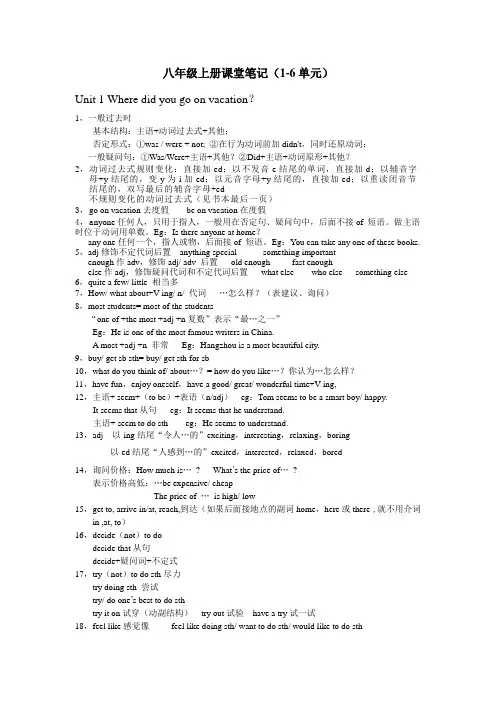
八年级上册课堂笔记(1-6单元)Unit 1 Where did you go on vacation?1,一般过去时基本结构:主语+动词过去式+其他;否定形式:①was / were + not; ②在行为动词前加didn't,同时还原动词;一般疑问句:①Was/Were+主语+其他?②Did+主语+动词原形+其他?2,动词过去式规则变化:直接加ed;以不发音e结尾的单词,直接加d;以辅音字母+y结尾的,变y为i加ed;以元音字母+y结尾的,直接加ed;以重读闭音节结尾的,双写最后的辅音字母+ed不规则变化的动词过去式(见书本最后一页)3,go on vacation去度假be on vacation在度假4,a nyone任何人,只用于指人,一般用在否定句、疑问句中,后面不接of 短语。
做主语时位于动词用单数。
Eg:Is there anyone at home?any one任何一个,指人或物,后面接of 短语。
Eg:You can take any one of these books. 5,adj修饰不定代词后置anything special something importantenough作adv,修饰adj/ adv 后置old enough fast enoughelse作adj,修饰疑问代词和不定代词后置what else who else something else 6,quite a few/ little 相当多7,How/ what about+V-ing/ n/ 代词…怎么样?(表建议、询问)8,most students= most of the students“one of +the most +adj +n复数”表示“最…之一”Eg:He is one of the most famous writers in China.A most +adj +n 非常Eg:Hangzhou is a most beautiful city.9,buy/ get sb sth= buy/ get sth for sb10,what do you think of/ about…?= how do you like…?你认为…怎么样?11,have fun,enjoy oneself,have a good/ great/ wonderful time+V-ing,12,主语+ seem+(to be)+表语(n/adj)eg:Tom seems to be a smart boy/ happy.It seems that从句eg:It seems that he understand.主语+ seem to do sth eg:He seems to understand.13,adj 以-ing结尾“令人…的”exciting,interesting,relaxing,boring以-ed结尾“人感到…的”excited,interested,relaxed,bored14,询问价格:How much is…? What’s the price of…?表示价格高低:…be expensive/ cheapThe price of …is high/ low15,get to, arrive in/at, reach,到达(如果后面接地点的副词home,here或there,就不用介词in ,at, to)16,decide(not)to dodecide that从句decide+疑问词+不定式17,try(not)to do sth尽力try doing sth 尝试try/ do one’s best to do sthtry it on试穿(动副结构)try out试验have a try试一试18,feel like感觉像feel like doing sth/ want to do sth/ would like to do sth19,a lot of= lots of =plenty of20,in the past在过去21,enjoy/ like doing22,感叹句:How+adj+主谓!How+adj+a/an +n单+主谓!What+ a/an +adj+ n单+主谓!What+ adj+ n复/ 不可数+主谓!23,more than=over超过less than 少于more or less或多或少24,wait for等待25,too many“太多”修饰可数名词复数too much“太多”修饰不可数名词much too“实在太”修饰形容词或副词26,because+从句because of +n/ V-ing /代词27,enough作adj修饰n,enough time enough moneyhave enough…to do sth eg:I have enough time to finish the work.enough作adv修饰adj/ adv old enough fast enough…enough for sb to do sth eg:The job is easy enough for me to do.not…enough to do The book isn’t easy enough for me to read.too…to…The book is too difficult for me to read.so…that…The book is so difficult that I can’t read.28,the next day第二天29,remember/ forget+to do要做+doing做过30,Stop sb from doing sth阻止Stop to do 停下来去做其他事Stop doing 停止正在做的事31,another two hours=two more hours32,at the top of在…顶端,名列…之前强调点on the top of在…上面强调面33,find out查明,弄清find找到(结果)look for寻找(过程)34,go on with/ doing sth继续原来的事go on to do sth继续做别的事35,so +adj +that +结果状语从句“如此……以致……”eg:I was so busy that I didn’t go to sleep for 3 days.so that 引导目的状语从句,以便,为了(in order to)eg:they got up early so that they could catch the early bus.so +adj +(a/ an+n单数)that It is so important a meeting that I can’t miss it.such+ a/ an+ adj + n单数+that It is such an important meeting that I can’t miss it.such+ adj+n复数/不可数+thatUnit 2 How often do you exercise?1,How如何(方式)how long多长(时间)答语常用“(For/ about +)时间段”how far多远(距离)答语常用“(It’s +)数词 +miles/ meters/ kilometers”how often多久一次(频率)答语常用“Always/ often/ every day/…”或“次数+时间”等表频率的状语How soon多快,多久以后,常用在将来时中。
八年级上册英语重点笔记(精)
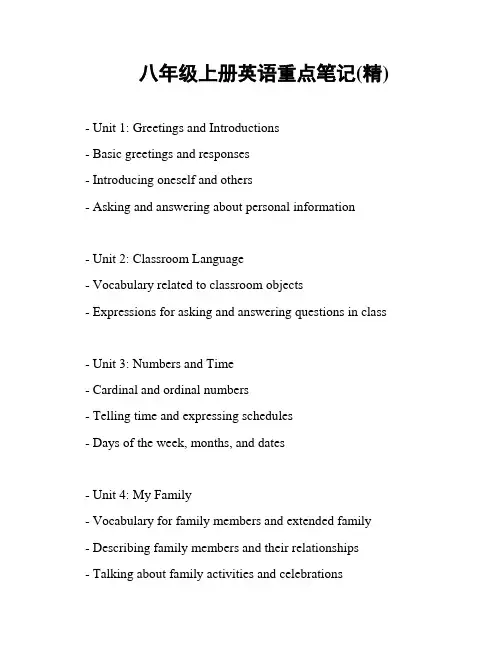
八年级上册英语重点笔记(精)- Unit 1: Greetings and Introductions- Basic greetings and responses- Introducing oneself and others- Asking and answering about personal information- Unit 2: Classroom Language- Vocabulary related to classroom objects- Expressions for asking and answering questions in class- Unit 3: Numbers and Time- Cardinal and ordinal numbers- Telling time and expressing schedules- Days of the week, months, and dates- Unit 4: My Family- Vocabulary for family members and extended family - Describing family members and their relationships- Talking about family activities and celebrations- Unit 5: School Life- Vocabulary related to school subjects and activities- Expressing likes, dislikes, and preferences in school- Talking about school rules and responsibilities- Unit 6: Daily Routine- Describing daily activities and routines- Time expressions for daily routines- Talking about personal habits and preferences- Unit 7: Food and Drinks- Vocabulary for food and drinks- Ordering food and drinks in a restaurant- Talking about preferences and dietary habits- Unit 8: Hobbies and Interests- Expressing likes, dislikes, and preferences in leisure activities - Talking about favorite hobbies and pastimes以上为八年级上册英语的重点笔记。
超详细八年级英语上册笔记,重点页码已标出,复制到
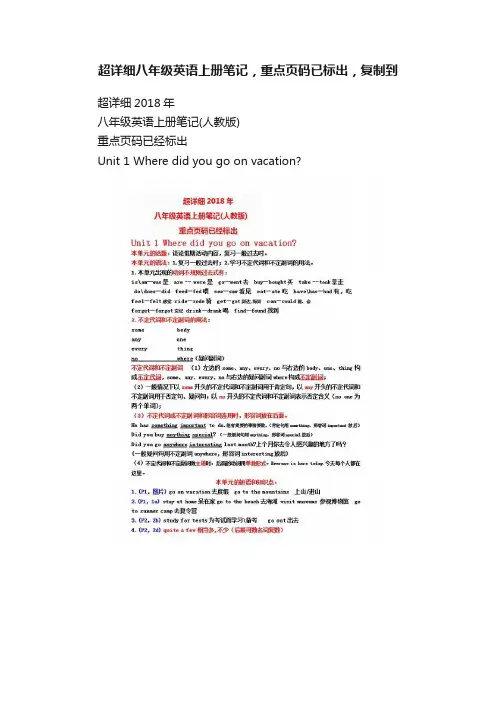
超详细八年级英语上册笔记,重点页码已标出,复制到超详细2018年八年级英语上册笔记(人教版)重点页码已经标出Unit 1 Where did you go on vacation?复制以下内容到word可打印Unit 1 Where did you go on vacation?本单元的话题:谈论假期活动内容,复习一般过去时。
本单元的语法:1.复习一般过去时;2.学习不定代词和不定副词的用法。
1.本单元出现的动词不规则过去式有:is\am--was是are -- were是go--went去buy—bought买take --took拿走do\does—did feed—fed喂see—saw 看见eat—ate 吃have\has—had 有,吃feel—felt感觉ride—rode骑get—got到达,得到can—could 能,会forget—forgot忘记 drink—drank喝 find—found找到2.不定代词和不定副词的用法:some bodyany oneevery thingno where(疑问副词)不定代词和不定副词(1)左边的some、any、every、no与右边的body、one、thing构成不定代词,some、any、every、no与右边的疑问副词where构成不定副词;(2)一般情况下以some开头的不定代词和不定副词用于肯定句,以any开头的不定代词和不定副词用于否定句、疑问句;以no开头的不定代词和不定副词表示否定含义(no one为两个单词);(3)不定代词或不定副词和形容词连用时,形容词放在后面。
He has something important to do.他有重要的事情要做。
(肯定句用something,形容词important放后)Did you buy anything special? (一般疑问句用anything,形容词special放后)Did you go anywhere interesting last month?上个月你去令人感兴趣的地方了吗?(一般疑问句用不定副词anywhere,形容词interesting放后)(4)不定代词和不定副词做主语时,后面的动词用单数形式。
八年级上册英语笔记1~10单元
八年级上册英语笔记(1 - 10 单元)一、Unit 1 Where did you go on vacation?(一)重点词汇1.anyone /ˈeniwʌn/ 任何人-解析:用于疑问句和否定句中,表示“任何人”。
-例句:Did anyone see my keys?(有人看到我的钥匙了吗?)2.wonderful /ˈwʌndəfl/ 精彩的;极好的-解析:形容事物非常好,令人愉悦。
-例句:We had a wonderful time on vacation.(我们在假期里过得非常愉快。
)3.few /fjuː/ 很少;几乎没有-解析:修饰可数名词,表示数量少。
-例句:There are few people in the park today.(今天公园里人很少。
)4.quite a few 相当多;不少-解析:强调数量比较多。
-例句:I took quite a few photos on my trip.(我在旅行中拍了不少照片。
)5.most /məʊst/ 大多数;大部分-解析:可作形容词、名词或副词。
-例句:Most people like to travel.(大多数人喜欢旅行。
)(二)重点句型1.Where did you go on vacation? 你去哪里度假了?-解析:这是一个特殊疑问句,询问过去的动作。
-例句:Where did you go last weekend?(你上周末去哪里了?)2.Did you go anywhere interesting? 你去了什么有趣的地方吗?-解析:一般疑问句,用“Did + 主语+ 动词原形”的结构。
-例句:Did you do anything special yesterday?(你昨天做了什么特别的事情吗?)3.I went to the mountains. 我去了山区。
-解析:简单的陈述句,表达过去的动作。
八年级英语上册 课堂笔记 外研版
八年级英语上册课堂笔记外研版八年级英语上册课堂笔记外研版八年级英语(上)课堂笔记Module 1 How to learn English一.词语链接:1. translate (v.) – translation (n.) – translator (n.人), pronounce (v.) –pronunciation (n.)advise (v.) – advice (U.n.), improve (v.) – improvement (n.), breathe (v.) – breath (n.)2. correct (v.;adj.=right)–wrong3. repeat = say again4.write/spell (v.) –writing/spelling (n.)5. base (n./v.) – basic (adj.)6. remember-forget,shy-outgoing(shy-shyer/shier-shyest/shiest),start-end, deep - low (反义词) 7. start=begin/open(同义词) 8. forget –forgot -forgotten,hear -heard -heard, send –sent -sent9. other 与else(别的,其它的)else作形容词时,通常放在疑问代词what或anything , something, nothing, nobody,等不定代词之后; else作副词时,通常放在疑问副词或anywhere等不定副词之后。
other作形容词,通常放在被修饰的名词之前; other还可作代词。
A. 1. What else do you want? Is there anybody else in the room?2. When else can I come? Would you like to go somewhere else?B. Please come some other day. 请改日再来。
八年级上册英语课堂笔记
八年级上册课堂笔记(1-6单元)Unit 1 Where did you go on vacation1,一般过去时基本结构:主语+动词过去式+其他;否定形式:①was / were + not; ②在行为动词前加didn't,同时还原动词;一般疑问句:①Was/Were+主语+其他②Did+主语+动词原形+其他2,动词过去式规则变化:直接加ed;以不发音e结尾的单词,直接加d;以辅音字母+y结尾的,变y为i加ed;以元音字母+y结尾的,直接加ed;以重读闭音节结尾的,双写最后的辅音字母+ed不规则变化的动词过去式(见书本最后一页)3,go on vacation去度假 be on vacation在度假4,anyone任何人,只用于指人,一般用在否定句、疑问句中,后面不接of 短语。
做主语时位于动词用单数。
Eg:Is there anyone at homeany one任何一个,指人或物,后面接of 短语。
Eg:You can take any one of these books. 5,adj修饰不定代词后置 anything special something importantenough作adv,修饰adj/ adv 后置 old enough fast enoughelse作adj,修饰疑问代词和不定代词后置 what else who else something else 6,quite a few/ little 相当多7,How/ what about+V-ing/ n/ 代词…怎么样(表建议、询问)8,most students= most of the students“one of +the most +adj +n复数”表示“最…之一”Eg:He is one of the most famous writers in China.A most +adj +n 非常 Eg:Hangzhou is a most beautiful city.9,buy/ get sb sth= buy/ get sth for sb10,what do you think of/ about…= how do you like…你认为…怎么样11,have fun,enjoy oneself,have a good/ great/ wonderful time+V-ing,12,主语+ seem+(to be)+表语(n/adj) eg:Tom seems to be a smart boy/ happy.It seems that从句 eg:It seems that he understand.主语+ seem to do sth eg:He seems to understand.13,adj 以-ing结尾“令人…的”exciting,interesting,relaxing,boring 以-ed结尾“人感到…的”excited,interested,relaxed,bored14,询问价格:How much is… What’s the price of…表示价格高低:…be expensive/ cheapThe price of … is high/ low15,get to, arrive in/at, reach,到达(如果后面接地点的副词home,here或there ,就不用介词in ,at, to)16,decide(not)to dodecide that从句decide+疑问词+不定式17,try(not)to do sth尽力try doing sth 尝试try/ do one’s best to do sthtry it on试穿(动副结构) try out试验 have a try试一试18,feel like感觉像 feel like doing sth/ want to do sth/ would like to do sth19,a lot of= lots of =plenty of20,in the past在过去21,enjoy/ like doing22,感叹句:How+adj+主谓!How+adj+a/an +n单+主谓!What+ a/an +adj+ n单+主谓!What+ adj+ n复/ 不可数+主谓!23,more than=over超过 less than 少于 more or less或多或少24,wait for等待25,too many“太多”修饰可数名词复数too much“太多”修饰不可数名词much too“实在太”修饰形容词或副词26,because+从句 because of +n/ V-ing /代词27,enough作adj修饰n, enough time enough moneyhave enough…to do sth eg:I have enough time to finish the work. enough作adv修饰adj/ adv old enough fast enough…enough for sb to do sth eg:The job is easy enough for me to do. not…enough to do The book isn’t easy enough for me to read.too…to… The book is too difficult for me to read.so…that… The book is so difficult that I can’t read.28,the next day第二天29,remember/ forget+to do要做+doing做过30,Stop sb from doing sth阻止Stop to do 停下来去做其他事Stop doing 停止正在做的事31,another two hours=two more hours32,at the top of在…顶端,名列…之前强调点on the top of在…上面强调面33,find out查明,弄清 find找到(结果) look for寻找(过程)34,go on with/ doing sth继续原来的事go on to do sth继续做别的事35,so +adj +that +结果状语从句“如此……以致……”eg:I was so busy that I didn’t go to sleep for 3 days.so that 引导目的状语从句,以便,为了(in order to)eg:they got up early so that they could catch the early bus.so +adj +(a/ an+n单数)that It is so important a meeting that I can’t miss it.such+ a/ an+ adj + n单数+that It is such an important meeting that I can’t miss it.such+ adj+n复数/不可数+thatUnit 2 How often do you exercise1,How 如何(方式)how long 多长(时间)答语常用“(For/ about +)时间段”how far多远(距离)答语常用“(It’s +)数词 +miles/ meters/ kilometers”how often多久一次(频率)答语常用“Always/ often/ every day/…”或“次数+时间”等表频率的状语How soon多快,多久以后,常用在将来时中。
八年级英语上册笔记(全部)
Unit1 Playing SportsTopic1 I’m going to play basketball.【重点短语】1. during the summer holidays 1.在暑假期间2. between…and… 2.在两者之间3. cheer sb. on 3.为某人加油4. prefer doing sth. 4.更喜欢做某事5. quite a bit/a lot 5.很多6. plan to do sth. 6.计划做某事7. have a skating club 7.举办滑雪俱乐部8. go skating/skiing/bicycling/climbing/hiking 8.去滑雪/滑冰/骑车/爬山/远足9. arrive in/at 9.到达10. play against…10.与……对抗/较量11. for long 11.很久12. leave for…12.动身去…13. the day after tomorrow 13.后天14. China’s national team14.中国国家队15. play baseball 15.打棒球16. at least 16.至少17. What a shame! 17. 多羞愧!18. be good at 18.善于做某事19. take part in 19.参加20. all over the world 20.全世界21. be good for 21.对……有益22. a good way 22.一种好方法23. keep fit/healthy 23.保持健康24. relax oneself 24.放松某人自己【重点句型】1. What’s your favorite sport? = What sport do you like best? 你最喜爱的运动是什么?2. Which sport do you prefer? = Which sport do you like better?你更喜欢什么运动?I prefer skating. = I like skating better. 我更喜欢滑雪.3. Do you skate much? = Do you often skate? 你常滑雪吗?4. She spends at least half an hour in the gym every day. 每天她至少花半小时在体育馆.5. She plays baseball pretty well and she is also good at jumping. 她棒球打得相当好而且擅长于跳.6. What kind of sports do you like? = Which sport do you like? 你喜欢哪种运动?7. Would you like to come and cheer us on? 你愿意来为我们加油吗?8. What are you going to be when you grow up? 当你长大后做什么?9. There is going to be a school sports meet next month.下月有一场运动会。
- 1、下载文档前请自行甄别文档内容的完整性,平台不提供额外的编辑、内容补充、找答案等附加服务。
- 2、"仅部分预览"的文档,不可在线预览部分如存在完整性等问题,可反馈申请退款(可完整预览的文档不适用该条件!)。
- 3、如文档侵犯您的权益,请联系客服反馈,我们会尽快为您处理(人工客服工作时间:9:00-18:30)。
八年级上册课堂笔记(1-6单元)Unit 1 Where did you go on vacation?1,一般过去时基本结构:主语+动词过去式+其他;否定形式:①was / were + not; ②在行为动词前加didn't,同时还原动词;一般疑问句:①Was/Were+主语+其他?②Did+主语+动词原形+其他?2,动词过去式规则变化:直接加ed;以不发音e结尾的单词,直接加d;以辅音字母+y结尾的,变y为i加ed;以元音字母+y结尾的,直接加ed;以重读闭音节结尾的,双写最后的辅音字母+ed不规则变化的动词过去式(见书本最后一页)3,go on vacation去度假be on vacation在度假4,a nyone任何人,只用于指人,一般用在否定句、疑问句中,后面不接of 短语。
做主语时位于动词用单数。
Eg:Is there anyone at home?any one任何一个,指人或物,后面接of 短语。
Eg:You can take any one of these books. 5,adj修饰不定代词后置anything special something importantenough作adv,修饰adj/ adv 后置old enough fast enoughelse作adj,修饰疑问代词和不定代词后置what else who else something else 6,quite a few/ little 相当多7,How/ what about+V-ing/ n/ 代词…怎么样?(表建议、询问)8,most students= most of the students“one of +the most +adj +n复数”表示“最…之一”Eg:He is one of the most famous writers in China.A most +adj +n 非常Eg:Hangzhou is a most beautiful city.9,buy/ get sb sth= buy/ get sth for sb10,what do you think of/ about…?= how do you like…?你认为…怎么样?11,have fun,enjoy oneself,have a good/ great/ wonderful time+V-ing,12,主语+ seem+(to be)+表语(n/adj)eg:Tom seems to be a smart boy/ happy.It seems that从句eg:It seems that he understand.主语+ seem to do sth eg:He seems to understand.13,adj 以-ing结尾“令人…的”exciting,interesting,relaxing,boring以-ed结尾“人感到…的”excited,interested,relaxed,bored14,询问价格:How much is…? What’s the price of…?表示价格高低:…be expensive/ cheapThe price of …is high/ low15,get to, arrive in/at, reach,到达(如果后面接地点的副词home,here或there,就不用介词in ,at, to)16,decide(not)to dodecide that从句decide+疑问词+不定式17,try(not)to do sth尽力try doing sth 尝试try/ do one’s best to do sthtry it on试穿(动副结构)try out试验have a try试一试18,feel like感觉像feel like doing sth/ want to do sth/ would like to do sth19,a lot of= lots of =plenty of20,in the past在过去21,enjoy/ like doing22,感叹句:How+adj+主谓!How+adj+a/an +n单+主谓!What+ a/an +adj+ n单+主谓!What+ adj+ n复/ 不可数+主谓!23,more than=over超过less than 少于more or less或多或少24,wait for等待25,too many“太多”修饰可数名词复数too much“太多”修饰不可数名词much too“实在太”修饰形容词或副词26,because+从句because of +n/ V-ing /代词27,enough作adj修饰n,enough time enough moneyhave enough…to do sth eg:I have enough time to finish the work.enough作adv修饰adj/ adv old enough fast enough…enough for sb to do sth eg:The job is easy enough for me to do.not…enough to do The book isn’t easy enough for me to read.too…to…The book is too difficult for me to read.so…that…The book is so difficult that I can’t read.28,the next day第二天29,remember/ forget+to do要做+doing做过30,Stop sb from doing sth阻止Stop to do 停下来去做其他事Stop doing 停止正在做的事31,another two hours=two more hours32,at the top of在…顶端,名列…之前强调点on the top of在…上面强调面33,find out查明,弄清find找到(结果)look for寻找(过程)34,go on with/ doing sth继续原来的事go on to do sth继续做别的事35,so +adj +that +结果状语从句“如此……以致……”eg:I was so busy that I didn’t go to sleep for 3 days.so that 引导目的状语从句,以便,为了(in order to)eg:they got up early so that they could catch the early bus.so +adj +(a/ an+n单数)that It is so important a meeting that I can’t miss it.such+ a/ an+ adj + n单数+that It is such an important meeting that I can’t miss it.such+ adj+n复数/不可数+thatUnit 2 How often do you exercise?1,How如何(方式)how long多长(时间)答语常用“(For/ about +)时间段”how far多远(距离)答语常用“(It’s +)数词 +miles/ meters/ kilometers”how often多久一次(频率)答语常用“Always/ often/ every day/…”或“次数+时间”等表频率的状语How soon多快,多久以后,常用在将来时中。
答语常用“in +时间段”how many多少(接可数名词)how much(接不可数名词)2,exercise作v 锻炼,运动作[c] 操,练习do morning/ eye exercises作[uc] 锻炼take much/ more exercise3,at+钟点at 7 o’clock at noon/ at night(during/ in the day)at this/ that time at the age of on+ 具体某天、星期、特指的一天、纪念日、节日on April 1st on Sunday on a cold winter morning on Teachers’ Dayin +上午、下午、晚上、年、月、季节、年代、世纪in the morning/ afternoon/ evening in 1999 in August in autumn in 1960s in the 21st century4,help sb (to)do sthhelp sb with sthwith sb’s help= with the help of sb5,do(the)housework= do chores6,频度副词(行前be 后)Always usually often sometimes seldom hardly never7,sometimes 有时(频度副词)sometime(将来)有朝一日,(曾经)某天Some times 几次,几倍some time 一段时间(前面用介词for)8,go shopping= do some shopping9,once twice three times10,at once,right now,right away,in a minute,in a moment,in no time 立刻,马上once more再一次,重新once upon a time 从前,曾经11,every day 每天everyday日常的,每天的12,on the internet13,what’s your favorite program?=what program do you like best?14,free 空闲的in one’s free time be free自由的as free as a fish freedom n.自由免费的The best things in life are free.15,be full =be busy忙的be busy doing sth/ be busy with sthbe full of充满eg:The bottle is full of milk.16,How come?怎么会?为什么?17,may be 为情态动词+动词原形,在句子中做谓语,maybe是副词,表示可能,大概,一般放在句首(perhaps)。
